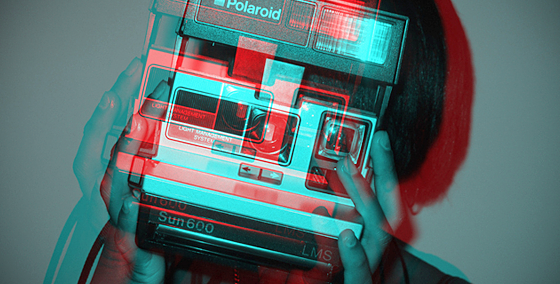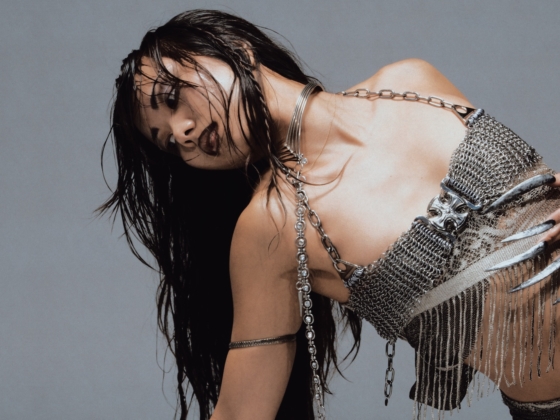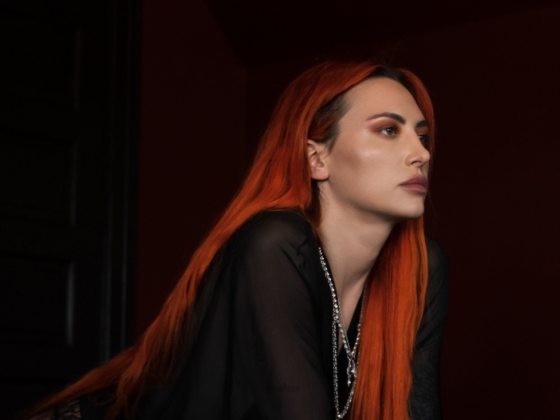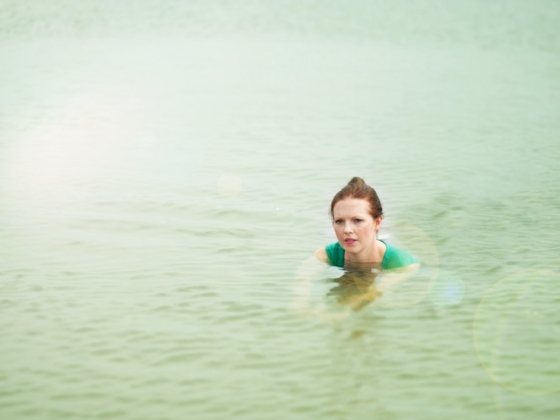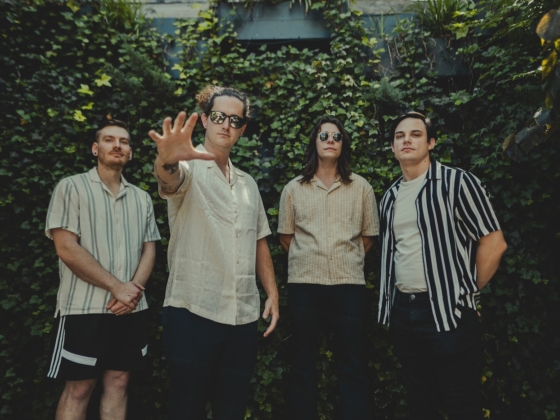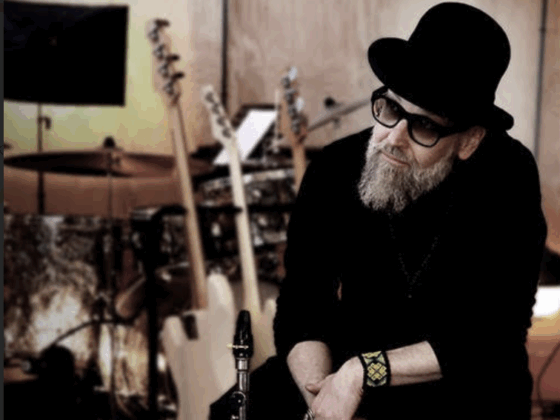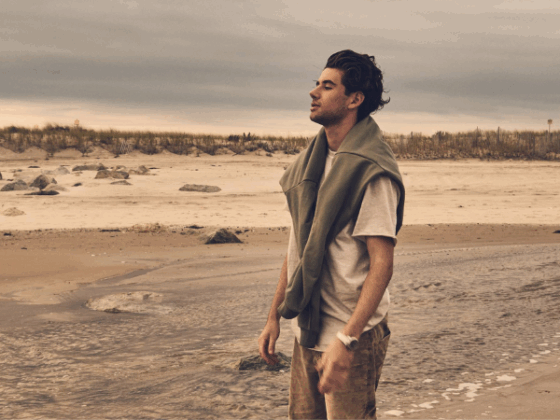Those who have been listening to electro house for some years have surely heard the name, Lazy Rich. This UK native has twelve years experience behind his talent on stage. From singles like "Damage Control" and "Brainfreeze", Richard Billas has been releasing electro house hits on his own label, Big Fish Records. He is credited as a pioneer of complextro music, a heavier side of electronic music that has aggressive synths and more structure.
On December 7th I had the chance to catch Lazy Rich perform at New City Gas in Montreal. What first started as a smaller crowd grew as the night stretched from 11pm to 3am. This Vancouver resident took the stage in the refurnished old church, where he rained a frenzy of electrifying synths and chilling bass on the crowd. Before his set I managed to catch up with Richard to ask him about the future of live performances, how musicians are profiting in todays industry, his biggest accomplishment so far, and much more.
EARMILK: Hey Richard, it's great to have you with EARMILK today, to start this line of questioning off I wanted to direct us towards your latest work. You've just completed your remix of Felix Cartal's single "New Scene". How did this remix come about?
Richard Billas: Felix and I actually just started sharing a studio, so we're studio buddies now. I heard him playing the track in the studio and I thought "damn, that's a good vocal." I had a weekend free in my schedule so I figured I might as well give it a go and see what came out.
[soundcloud url="https://api.soundcloud.com/tracks/123057356" params="color=ff6600&auto_play=false&show_artwork=true" width="100%" height="166" iframe="true" /]
EM: So how long did the remix take you then?
RB: It was about three or four days work. When you get parts that are that good, it's easy to remix a track. I've spent months on remixes before when there's nothing to work with but when you get such a strong vocal it's easy.
EM: What are the first five things you do when you usually open your computer? In reference to anything.
RB: It's always Twitter, Facebook, Soundcloud, emails, Skype. I try to be connected as much as I can and try stay on top of my social sites. It's important to message back fans by replying on twitter and answering people's questions. I can't get to all of them, sometimes people can be a little demanding and I just can't make time for it. I really like the sense of being in a community because I'm self employed, I work on my own so there's none of the office communication you usually get. Skype and Facebook for me are good way to speak with friends. People like FTampa and Alex Mind.
EM: Are these two on your label?
RB: They're people I've had on my label before, just general contacts from the industry. We're all good friends, we all get along. I'm here now in Montreal with Botnek. We met a couple weeks ago in Vancouver, they were in town so we went out for Sushi. These are just people who I've met through EDM and now we're friends. It's so cool to have friends in every city, to go and meet people who are so on your wave length, who know everything you talk about. It's really fun.
[soundcloud url="https://api.soundcloud.com/tracks/51880345" params="color=ff6600&auto_play=false&show_artwork=true" width="100%" height="166" iframe="true" /]
EM: It also comes with production, you guys can feed off each others ideas, which is making collaborations so interesting.
RB: Oh yeah, we often throw tracks around, half finished stuff and say how does this sound?
EM: Do you think social media sites have had a major affect on the growing popularity of EDM?
RB: Absolutely, it's without a question of a doubt. I mean I'm probably not as good as I should be with social media since I'm a little bit older than a lot of these new musicians. But it is such a useful tool for getting your music out there, it's so great that you put a track on Soundcloud and then instantly like thirty thousand people can just hear it. It's instant now. It becomes everywhere online and anyone can hear it, it's so good.
EM: With EARMILK as well, blogs are expanding and hype machine offers a way to filter content, it's becoming insane the way that people can access music these days.
RB: Absolutely.
EM: So how active are you when you have free time, are you in the studio producing a lot or are you busy with other things in life?
RB: I probably produce three days a week, sometimes nine ‘til seven. It depends on how many gigs I've got. I also run a site called Labe lEngine, we do distribution, accounting, and promotion for record labels. Stuff like that.
EM: Is that similar to web design?
RB: Programing, management, web design, it's a pretty big company. We have over a thousand labels that we distribute.
[soundcloud url="https://api.soundcloud.com/tracks/91329576" params="color=ff6600&auto_play=false&show_artwork=true" width="100%" height="166" iframe="true" /]
EM: So do you do this in the day and then DJ by night or?
RB: Uhm, not exactly. I manage the company and we have an office in LA, I manage a team of programmers and a team of customer service people so it's more of an ongoing thing.
EM: What advice would you give to someone ten years in the past on the production of music? Without any financial incentive for them.
RB: Ahhh, that's a really hard one… I'll need to think about that one. Can we come back to this question?
EM: Certainly, although this next question might need a little thought as well. What advice do you think someone twenty years in the future would give you for live performances?
RB: Well with the way things are going now, it's becoming almost like a live circus. It's a show, a proper show the way things are headed. I would like to see more showmanship there because right now it's still a show but it's one person. Maybe he'll stand on the decks, maybe he'll put his hands in the air but I'd like to see a live aspect to it. I don't think that's really there right now, personally I put as much as I feel I can put in but I'm not at the same level as some of these other guys. I don't have a budget for all these pyrotechnics and stuff like that. There's got to be more that can be done than just some guy DJ'ing and some fancy lights wowing the crowd.
EM: Yet on that note, there hasn't always needed to be this extra push. I feel only recently there's been such a trend to have that something extra for live shows. Now it's who can bring balloons? Who can bring 3D visuals? Who can bring confetti?
RB: What I love the most when I'm DJ'ing, is when it's an underground club with three hundred people, really dark, really dingy, smelly, sweaty, where everyone is just raging like crazy. Those are the best experiences for me! I would way rather be there than at a festival with thirty thousand people dancing to the same stuff everyone hears all the time, you know? I'd rather be somewhere underground hearing one guy, in his element, doing something he loves. You actually get that interaction that makes you feel like you're a part of it. There's an intimate vibe in these smaller settings. That's what does it for me and I would prefer to play in an underground club so much more.
EM: So how important do you think the DJ's presence is on stage? Do you think he needs to be really engaging with the crowd?
RB: They don't need to be really interactive with the crowd, but the DJ needs to look like they're enjoying themselves. That to me is the key. That's why I love Dada Life!
EM: *laughs* Agreed, they're crazy on stage! Absolutely insane.
RB: They're not necessarily on the mic that much, they're not necessarily doing crazy antics but they look like they're having so much fun on stage. You see other DJs who are huddled over and you think "why are you here?" I mean Djing for me is the combination of all the work I've spent in the studio, the time I've spent trying to build my name up, I'm finally there on the stage, and I've got an audience. I love being up there and I try to show that as much as possible. It was one of the harder things to learn, I mean I'm a rather shy computer nerd. To be able to go up there and have this presence is a hard thing to learn.
EM: What do you think it is then? What is one of the best things that you love about being up there? Is it the rush or people loving what you've created?
RB: I'll tell you what it is, it's the one time in my life I ever show off. I'm a very introverted guy so it's the one time in my life I can actually stand there and say, "I've done something and it's good".
EM: Totally. Do you think musicians labour has shifted towards live performances more or do you think there's still an moderate balance with recording tracks?
RB: I think there's a level where live performance becomes more of an issue. It's kind of like the ten thousand dollar boundary, once you start getting to that level for gigs you start to be able to do tours, it becomes more about the lighting, visuals, the show and all that. For people at my level it's more about how well you're known and how the crowd enjoys your set. There's more emphasis on the music and I like that.
EM: A lot of artists are giving away their music for free while a lot of your tracks on Soundcloud have links to Beatport. Do you think you ever might lose some attention this way, not following the trend?
RB: It's starting to head that way. I'm getting less and less happy with how things have gone on Beatport just because so many labels are buying their own tracks and it's disgusting.
EM: What do you mean by that?
RB: Artists and labels will buy copies of their own tracks to get the tracks higher in the charts.
EM: Really? So it's almost like the idea of ghost producing but ghost sales?
RB: Exactly, it's cheating but it's the cheapest form of promotion there is. If you want your name to be in the top ten, it's great promotion. All you need to buy is a couple hundred copies of your own track and you'll be in the top ten on Beatport. The sales are horrendously low.
EM: Have you ever come into any legal trouble with pirated or leaked music?
RB: Well so much of my stuff has been pirated over the years. It's a double edged sword: the piracy is good because more people get to hear your track, which is awesome. I owe a huge part of my career to it, tons of people wouldn't hear my music otherwise. Yet at the same time I see hardly any money from record sales.
EM: So are you having to make a lot more of your money on live performances? What else are musicians doing to make money?
RB: Well once you get to a certain level the live performances can bring in really good money. But people do a lot of things, personally I do my Label Engine side of things, other musicians do ghost producing, some make software, and lots still have day jobs.
EM: So it is having quite a big impact on the labour of musicians.
RB: I don't think people realize how bad the situation is. People don't realize that to get into the top hundred on Beatport you need to sell forty or so copies. That's it, forty. People have the mentality, "this guy's in the top hundred on Beatport, he must be raking it in right now, making huge dollars" but we're making nothing right now.
EM: It truly is, as you said, a double edged sword but there's nothing to be stopped, it will always be there now because of the accessibility the Internet offers.
RB: Absolutely! I mean it's great as well because people are listening and I get bookings everywhere now because people hear my music. I mean, I play some gigs and I'll look at the CDJ of the guy opening up for me and he'll be playing pirated versions of my songs. It's like what do you do with that?
EM: Alright, we're running out of time so I'm going to get to the quick questions. Biggest accomplishment in the industry?
RB: I was really proud to get number one on Beatport back in the day and playing Digital Dreams in Toronto was huge for me this year.
EM: Final question here, what percent of milk do you usually drink?
RB: Two percent.
EM: Wonderful! Thanks a lot Richard, it was really insightful to have you with us today.
Make sure you check out


